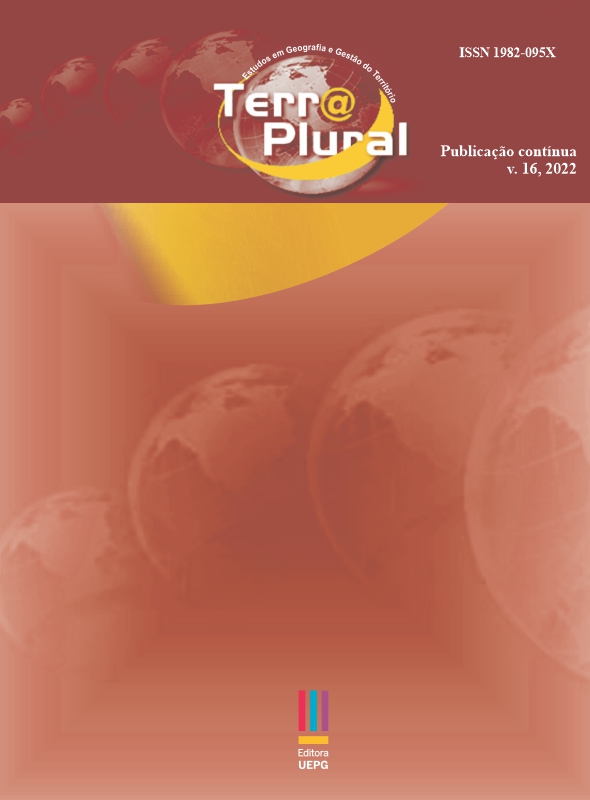The The Hybrid Space in Santa Maria (RS): Experiencing the city as a Pokémon Go player
Keywords:
Digital games, Phenomenology, Real Space, Virtual Space, Self-narrativesAbstract
We studied the smartphone’s game, Pokémon Go, from the perspective of phenomenology and the player's experience The experience constitutes and is constituted by the concept of hybrid space, given by the presence and movement of the player in the ‘real’ and’ ‘virtual’ spaces. We operationalized the search through self-narratives produced by the main author of the articleI in his actions as a player in the urban space of Santa Maria (RS). As a result, we verified that there is a crucial importance of the body and movement for the production of the experience and that the hybrid space, conformed in the practice of playing, expands the network of meanings of the urban space. In addition, we note a relationship between the practice of Pokémon Go and the concept of ‘geograficity’, which we call ‘hybrid geograficity’.
Downloads
References
Dardel, E. (2015) O homem e a Terra: natureza da realidade geográfica. São Paulo: Perspectiva.
Fernandes, J.L.J. (2011) Tecnologia, georreferenciação e novas territorialidades –o caso do geocaching. Cadernos de Geografia. 30 (31),171-180. DOI: https://doi.org/10.14195/0871-1623_31_16
Ferreira, J. (2006). Lugar, espaço e Geografia: Do real ao virtual na sociedade do conhecimento. Revista da Faculdade de Ciências Sociais e Humanas. 18, 65-82. Recuperado de: https://core.ac.uk/download/pdf/303717595.pdf
Instituto Brasileiro de Geografia e Estatística. (2015) Malhas territoriais. Rio de Janeiro: Autor. Recuperado de ftp://geoftp.ibge.gov.br/organizacao_do_territorio/malhas_territoriais/malhas_municipais/municipio_2015
Instituto de Planejamento de Santa Maria. (2020) Mapas. Santa Maria: Autor. Recuperado de http://iplan.santamaria.rs.gov.br/mapas.php
Johnson-Mardones, D. (2018) Algunas notas sobre investigación-acción como auto-narrativa.Revista Brasileira de Pesquisa (auto) Biográfica. 03(09), 860-870. DOI: https://doi.org/10.31892/rbpab2525-426X.2018.v3.n9.p740-743
Lindón, A. (2008) De las geografias construtivistas a las narrativas de vida espaciales como metodologías geográficas cualitativas. Revista da ANPEGE 4. DOI: https://doi.org/10.5418/RA2008.0404.0001
Merleau-Ponty, M. (2016). Fenomenologia da Percepção. 4 ed. São Paulo: WMF.
Monteiro, J. P. de A. (2013). Do lugar à geograficidade e à consciência geográfica. Dissertação de Mestrado, Universidade de São Paulo, São Paulo, SP, Brasil. Disponível: https://teses.usp.br/teses/disponiveis/8/8136/tde-23102014-181806/pt-br.php
Nascimento, T.F. (2016). Os terreiros de cultos afro-brasileiros e de origem africana como espaços possíveis às vivências travestis e transexuais. Dissertação de Mestrado, Universidade Federal de Santa Maria, Santa Maria, RS, Brasil. Disponível: https://repositorio.ufsm.br/handle/1/9470
Nogueira, A.R. B (2006). A geograficidade dos comandantes de embarcação no amazonas. Terra Livre.01 (26), 91-108. Recuperado de http://www.agb.org.br/publicacoes/index.php/terralivre/article/view/209/193
Santos, D.P. dos. (2017). Observações sobre a doutrina do homem-medida: uma tentativa de reconstituição do pensamento de Prótagoras. Dissertação de Mestrado, Universidade Estadual de Maringá, Maringá, PR, Brasil. Disponível: http://repositorio.uem.br:8080/jspui/handle/1/2747
Scarpa, M. C. T. (2019)Intencionalidade: Merleay-ponty e Babaras. Revista da Abordagem Gestáltica, 25(02), 148-155. DOI: 10.18065/RAG.2019v25n2.5
Silva, C. A. F. da. TANCMAN, M (1999). A dimensão socioespacial da ciberespaço: Uma nota. GEOgraphia, 01 (02), 55-66. DOI: https://doi.org/10.22409/GEOgraphia1999.v1i2.a13351
Silva, A. de Souza e. (2006). From cyber to hybrid: Mobile technologies as interfaces of hybrid spaces. Space and Culture, 09 (03), 261-278. DOI: https://doi.org/10.1177%2F1206331206289022
Silveira, D. S. (2019). Entre o material e o virtual: A percepção do espaço a partir de Pokémon Go. Dissertação de Mestrado, Universidade Federal do Paraná, Curitiba, PR, Brasil. Disponível: https://acervodigital.ufpr.br/handle/1884/62213
Downloads
Published
How to Cite
Issue
Section
License
Revista Terr@ Plural will obtain the auctorial rights for all published texts. This also implies that the text can be published anywhere in the world, including all rights on renewal, expansion, and dissemination of the contribution, as well as other subsidiary rights. The authors get permission to publish the contribution in other media, printed or digital, it may be in Portuguese or translation since the publication is credited to Revista Terr@ Plural. It allows the self-archiving of published articles in institutional repositories, thematic repositories, or personal web pages in the pdf version downloaded from the journal's site.















